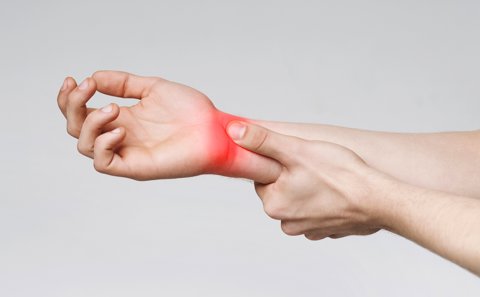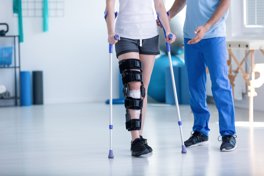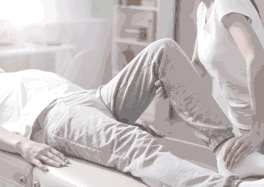
Matthew Trusch
Head of Personal Injury
Carpal Tunnel Syndrome (CTS) is caused by nerve damage to your wrist, which can develop from an injury or exposure to vibrating tools at work. It can be an extremely painful and persistent condition, causing sleepless nights and weakness in your hands.
You shouldn’t have to suffer if someone else was responsible for you developing CTS, so our expert Personal Injury lawyers are here to help you achieve compensation, so you can access the treatment and support you deserve. Get in touch with us for a Free Case Assessment – we often deal with claims on a No Win, No Fee basis.
Carpal Tunnel Syndrome can happen when the carpal tunnel, a narrow passageway in your wrist, is bent or squashed, putting pressure on your nerves. Women are more likely to develop CTS – this is thought to be because of fluid retention caused by hormones, and the fact that women generally have narrower wrists than men. Those who work in some industrial jobs are also at higher risk of CTS, because of their exposure to vibrating tools.
You may also develop CTS from an injury to your hand, wrist or arm – whether this is at work, in a public place or in a road traffic accident. Your employer, councils/businesses, and other drivers on the road have a legal duty of care to keep you safe, so if someone else is responsible for you developing CTS, we could help you claim compensation.
The lower arms, hands and wrists have many bones, nerves and tendons, which can make you vulnerable to developing CTS from injuries such as:
Fill in the form below to get in touch with one of our dedicated team members, or call our team today on: 0800 260 5010




The exact amount of compensation you could receive will depend on how severe your condition is, how it’s affecting you now, and any support you may need in the future. We will need to make sure that we can prove this resulted from your job and it was not something which naturally occurred.
Compensation is split up into two types:
The largest part of your compensation will be special damages, as they depend on your specific situation. You may have had to take time off work because of your CTS, so compensation can account for loss of earnings. If your job was manual or you work with tools which produce vibration, you may even need a career change, so compensation can also pay for any training needs.
Some guidelines for general damages are set out below – but it’s important to note these are just a guide and a baseline – your special damages will be added on top of these.
|
Example scenario (based on Judicial College Guidelines 16th Edition) |
Scale |
|
Disability affecting both arms with the need for surgery and loss of employment |
£21,910 to £23,130 |
|
Continuing but fluctuating symptoms, affecting one arm |
£14,900 to £16,340 |
|
Symptoms that are resolved within 3 years |
£8,640 to £10,750 |
|
Carpal Tunnel Syndrome that recovered within a few weeks/months |
£2,200 to £3,530 |
To claim compensation for Carpal Tunnel Syndrome, we must be able to prove that someone else was at least partly responsible for your injury or exposure to vibrating tools, which caused your CTS to develop but also that this was not naturally occurring and resulted from your work. This is where our Personal Injury team can help.
If you had an accident at work that caused your injury was not your fault, or was at least partly someone else’s responsibility, you could be eligible to make a claim. For example, you may have developed CTS from:
Your employer has a legal duty of care to ensure you have the correct equipment, clothing and training to help prevent accidents at work. You have a responsibility to follow Health and Safety guidelines when it comes to operating machinery or carrying heavy equipment, but if you believe your employer failed in their duty of care, get in touch with us for advice today.
Our Personal Injury lawyers have helped thousands of people who have sustained hand, wrist, finger, arm and elbow injuries in an accident at work, which then developed into Carpal Tunnel Syndrome. We could also help if you developed CTS from an injury you suffered in the military.
You may have Carpal Tunnel Syndrome as a result of an injury you suffered in a road accident – for example, your arm may have been crushed in a collision. We have a track record in securing millions of pounds for people involved in road accidents involving:
Driving involves a lot of repetitive action, such as steering and changing gears, so compensation could cover the cost of a new car/vehicle or any aids and adaptations that are recommended to you as a result of your CTS. This could help you whether you drive regularly, or you drive regularly as part of your job e.g. a taxi or delivery driver.
If you suffered an injury in a public place, such as a pavement, shop, restaurant or other business, the organisation in charge should have taken steps to make sure the environment was as safe as possible. If you developed CTS as a result of your injury, see if we could help you make a claim for compensation against whoever was responsible. For example, you may have broken, fractured or dislocated your wrist or hand and then developed CTS after:
Although it’s rarer for children to develop CTS, you can even make a claim on behalf of your child if they were injured and developed CTS because of faulty equipment or unsafe surfaces in a park or activity centre.
You may be suffering from Carpal Tunnel Syndrome because of a surgical error, or it may have been caused or worsened because of a medical professional’s actions or negligence. For example:
If you believe this happened to you, our expert Medical Negligence team can advise you on whether you could make a claim.
Carpal Tunnel Syndrome is a common symptom of pregnancy which occurs naturally because of hormonal changes and fluid retention. However, there are some examples of medical negligence during pregnancy, so if you believe your CTS was caused or made worse because of negligent care, our Medical Negligence lawyers are here to help you.
We have a track record of recovering thousands of pounds compensation for people with Carpal Tunnel Syndrome and other injuries.
We use straightforward language to make things simple. We can also visit you anywhere in England and Wales, at home or in hospital.
We’re nationally accredited solicitors, and many of our lawyers are listed on respected legal directories such as Chambers & Partners and Legal 500.
You’ll be kept up to date at every stage in the process, while we gather evidence and work out your compensation amount.
Here is what you can expect from the claims process, once you get in touch with us.
If we think you’ve got a chance of getting compensation, we’ll get in touch with the other party, to ask them to admit liability for your Carpal Tunnel Syndrome. This might be your workplace or another firm or supplier if the CTS is vibration-related. If you suffered your injury in a public place, it might be a local authority or business.
We’ll start to collect evidence to prove that your injury happened because of someone else’s actions or negligence. This might include CCTV footage, photos, logbooks if it happened in public or your workplace. It might be witness statements from other people you worked with who were also exposed to vibrating tools,
We’ll send you to an independent medical expert, who will assess your Carpal Tunnel Syndrome, when it first started, and how it has affected your life. We try to intervene early if we think you’d benefit from rehabilitation, which is often very important for CTS. Sometimes the other party can send you early interim payments, if they admit responsibility before the claim is settled.
Based on your medical assessment, we’ll work out how much compensation you’re owed and take this to the other party.
If the other party does not accept responsibility, then the claim may have to go to Court. Fortunately, this doesn’t happen with most Personal Injury claims. If it does, we’ll keep you informed and provide expert advice throughout the whole process.

In the UK, many people decide to claim compensation after being injured due to an accident which was someone else’s fault. In law, this is called a Personal Injury Claim. The most common of these accidents include road traffic accidents and accidents at work.

When you’re claiming compensation, the process can sometimes take longer than you’d planned. Whether it’s due to things taking longer in terms of settling on an amount, or if the process is just taking a while because of these services being overwhelmed, sometimes, things don’t go according to the timelines you expected.

With former Justice Secretary, Jack Straw, recently speaking out against the personal injury industry and claiming that a "compensation culture" exists in the UK, Nicola Hardy, a Senior Associate Solicitor at Simpson Millar explains, soft tissue injuries are an area that has come under particular scrutiny from officials.
The symptoms of Carpal Tunnel Syndrome can be hugely disruptive to your life, and can include:
We’ll take these factors into account to value your claim. If your dominant hand/arm has been impacted, the consequences can be much more significant, so our lawyers will take this into account.
Usually for Personal Injuries, you have 3 years from the day you were injured to make a claim for compensation. However, with Carpal Tunnel Syndrome, the deadline to start your claim will be three years from the date your condition was diagnosed by a doctor.
We could handle your claim on a No Win, No Fee basis. This means that if we don’t win your case, you won’t need to pay us, so it can take away financial stress for you. We believe in openness and complete transparency when it comes to billing our clients, so you will always be aware of what the final bill could be at the end of the process.
Another one of your concerns might be how much money you’ve already lost, or spent, because of your Carpal Tunnel Syndrome. If the other party in your claim admit responsibility, we could ask them to make early interim payments to help you pay for urgent support and rehabilitation before we even reach a settlement.
Compensation can help you in a variety of ways with your condition - Carpal Tunnel Syndrome can have a huge impact on other areas of your life, and you might not have considered this fully, which is why it’s important to get one of our specialist lawyers on your side.
To help get you the compensation you need, we’ll make sure all bases are covered when making our assessment and investigations, including:
You might have had to undergo surgery for your CTS if you’re still suffering from pain after a long time and other treatments have not worked. Surgery usually cures CTS, but it can take about a month to get back to work and your normal activities. Compensation can help you return to the best quality of life possible, by helping you claim back income you have lost and helping you to buy aids and adaptations to help you with jobs around the house.
Wrist splints and steroid injections can also help with CTS, but can stop you from being able to perform simple tasks. When you make a claim with us, we will take into account any of these knock-on effects, to secure the compensation you deserve.
You can get many types of rehabilitation and support for Carpal Tunnel Syndrome, some of which you may have already had or paid for. If your condition was complicated and got worse despite treatment, compensation can account for care you might need in the long-term including:
Some people are more at risk of developing Carpal Tunnel Syndrome. For example, you could be more at risk if you:
However, if we can prove that the condition was made worse or even partly linked to exposure to vibration at your workplace, or an injury that wasn’t your fault, you could be eligible to claim compensation, so we’d advise you to get in touch today.
Fill in the form below to get in touch with one of our dedicated team members, or call our team today on: 0800 260 5010